Need to work off some holiday calories? Kids getting bored on break? Out-of-town relatives staying longer than you thought they would?
The solution to these issues is right outside your door. Yes, it’s a little chilly, but research shows that getting outside, even in the cold, has benefits. And if a healthier lifestyle is part of your New Year’s Resolutions, you’ll be pleased to know that some doctors are now prescribing outdoor activity for a variety of conditions.
Many N.C. Environmental Education Centers and other organizations that provide environmental education have special programs planned this week and into the New Year. You can search for these in your area on the Office of Environmental Education’s Web site.
Want to know more about the benefits of environmental education and outdoor activity? Visit our EE Research and Data page.
Stories about the people, places and organizations in the North Carolina environmental education community.
Tuesday, December 29, 2009
Friday, December 11, 2009
Environmental Education Center Friday, Dec 11, 2009

Today we travel to N.C.’s ancient Uwharrie Mountains. The Caraway Conference Center and Camp is located 7 miles west of Asheboro, near Sophia. They provide a wide range of outdoor activities for conference attendees and campers in this beautiful natural setting. Camp Caraway is also the home of the A.C.O.R.N.S. (Awesome Children’s Outdoor Recreation & Nature Study) environmental education program. A.C.O.R.N.S. is designed for students in the 3rd, 4th, and 5th grades, and blends the state science curriculum with outdoor recreation to give students an outdoor learning experience that is exciting, memorable, and engaging. ACORNS is available to public, private, and homeschool groups on Tuesdays & Thursday in the late spring & early fall semesters.
Even with a nip in the air, EE Centers are a great place to visit. Visit the EE Centers online to explore more of them. As a matter of fact, outdoor recreation (even when it’s cold!) has been shown to boost mood and concentration.
Even with a nip in the air, EE Centers are a great place to visit. Visit the EE Centers online to explore more of them. As a matter of fact, outdoor recreation (even when it’s cold!) has been shown to boost mood and concentration.
Grandfather Mountain Produces "Nature Minutes"
Grandfather Mountain and Digital South Media Group have partnered to produce a series of educational "Nature Minutes" about the flora and fauna one of our newest State Parks. The nature minutes also discuss sustainability efforts and conservation. The video below takes a look at some of Grandfather's resident animals and how they deal with winter temperatures. You can view the other Nature Minutes on Grandfather Mountain's Web site.
The Grandfather Mountain Stewardship Foundation now operates the nature museum and attractions so many are familar with, and provides environmental education programs to the public and school groups. In 2009, Grandfather Mountain, Inc. sold 2,700 acres of the park's backcounty to the state of North Carolina for the Grandfather Mountain State Park. The North Carolina Division of Parks and Recreation and the Grandfather Mountain Stewardship Foundation work together to manage and protect this natural treasure for the good of the people of North Carolina.
The Grandfather Mountain Stewardship Foundation now operates the nature museum and attractions so many are familar with, and provides environmental education programs to the public and school groups. In 2009, Grandfather Mountain, Inc. sold 2,700 acres of the park's backcounty to the state of North Carolina for the Grandfather Mountain State Park. The North Carolina Division of Parks and Recreation and the Grandfather Mountain Stewardship Foundation work together to manage and protect this natural treasure for the good of the people of North Carolina.
Two N.C. Schools Win National GreenWorks! Grants

Project Learning Tree® (PLT), the environmental education program of the American Forest Foundation, has awarded GreenWorks! grants to Franklin High School in Sylva and Old Richmond Elementary School in Tobaccoville. “These grants support students committed to helping their communities and the environment,” said Renee Strnad, North Carolina PLT co-coordinator.
Franklin High School students will work with Southwestern Community College and other partners to restore habitat along a portion of the Little Tennessee River Greenway in Franklin, North Carolina. “Students will apply their experience to agricultural education classes, career awareness, and vocational or collegiate preparedness while they restore the area to its natural biodiversity and beauty,” said Mary Bennett, project co-coordinator and college readiness coach at Southwestern Community College.
Students in grades K through 5 at Old Richmond Elementary School, with help from Boy Scouts, will restore six garden beds. Each grade will set a goal for its garden, such as to attract butterflies or grow herbs. “Students will discuss their ideas and vote online to select their grade’s project choice,” said fifth-grade teacher Kathy Joyce.
Since 1992, Project Learning Tree has distributed more than $700,000 to fund 907 grant projects in communities across the country. For more information about GreenWorks!, and a complete list of Project Learning Tree’s GreenWorks! grant awards, visit http://www.plt.org/ or contact Vanessa Bullwinkle, Director of Communications, 202.463.2472 or vbullwinkle@forestfoundation.org.
For more information about PLT in North Carolina, contact Renee Strnad, North Carolina State University, at 919.515.5518 or renee_strnad@ncsu.edu, or visit www.ces.ncsu.edu/plt .
Friday, December 4, 2009
Representative Etheridge Latest Co-Sponsor of NCLI Act

The National Wildlife Federation reports that Represetative Bob Etheridge is the latest co-sponsor of the No Child Left Inside Act - H.R. 2054. This brings the total number of co-sponsors to 83. Congressman Etheridge joins fellow N.C. Representatives David Price and Heath Shuler.
For more information on No Child Left Inside, see the video on the Thursday, November 12, 2009 post and these details on the NCLI Coalition Web site.
Monday, November 30, 2009
EETAP Releases Article on EE for Culturally Diverse Groups

From the Environmental Education & Training Partnership:
Demographic changes and the emergence of a more global society have challenged the field of environmental education to be more inclusive and to offer programming that is relevant to culturally diverse groups. But what do we mean by diversity, and where is the EE field going with it? “Still Developing the Toolbox: Making EE Relevant for Culturally Diverse Groups,” by Joanne M. Lozar Glenn addresses this question and profiles five organizations working to connect their programming to the communities they serve.
(Note: This article features Ross Andrews, director of the Walnut Creek Wetlands Center in Raleigh).
From creating learning groups to reaching urban, immigrant and native audiences, these organizations address what it means to work with diverse audiences and how connecting with these communities changes what they’re doing and how that work gets done. The article includes 10 “learnings” that have emerged from environmental educators who are on the ground and at the forefront of efforts to make EE more inclusive. The article also provides a list of resources (books, articles, websites, programs, and organizations and individuals) designed to inspire readers who want to learn more about this topic and to get ideas they can apply to their own work.
Download the article
Demographic changes and the emergence of a more global society have challenged the field of environmental education to be more inclusive and to offer programming that is relevant to culturally diverse groups. But what do we mean by diversity, and where is the EE field going with it? “Still Developing the Toolbox: Making EE Relevant for Culturally Diverse Groups,” by Joanne M. Lozar Glenn addresses this question and profiles five organizations working to connect their programming to the communities they serve.
(Note: This article features Ross Andrews, director of the Walnut Creek Wetlands Center in Raleigh).
From creating learning groups to reaching urban, immigrant and native audiences, these organizations address what it means to work with diverse audiences and how connecting with these communities changes what they’re doing and how that work gets done. The article includes 10 “learnings” that have emerged from environmental educators who are on the ground and at the forefront of efforts to make EE more inclusive. The article also provides a list of resources (books, articles, websites, programs, and organizations and individuals) designed to inspire readers who want to learn more about this topic and to get ideas they can apply to their own work.
Download the article
Monday, November 23, 2009
NOAA Environmental Education Bill Passes House Committee
The House Natural Resources Committee has voted 22 to 13 to send H.R. 3644 to the House floor. This bill would create a national Environmental Literacy Grant program (through NOAA) and would elevate the Bay Watershed Education and Training program to the national level. This bill was introduced by Congresswoman Lois Capps of California (See October 6 post below).
Details about the bill and a link to the full bill text is available on the Campaign for Environmental Literacy Web site.
Details about the bill and a link to the full bill text is available on the Campaign for Environmental Literacy Web site.
Thursday, November 19, 2009
First Statewide Outdoor Classroom Symposium Held in Chapel Hill
North Carolina’s first Outdoor Classroom Symposium was held October 22-24 at the N.C. Botanical Garden in Chapel Hill. This symposium focused on techniques for creating, maintaining and using outdoor classrooms and provided strategies for integrating outdoor learning into the curriculum. More than 150 teachers, teacher assistants, school administrators, parent volunteers, non-formal educators, landscape architects and playground designers from across the state came together for this inaugural event. The symposium was held in the N.C. Botanical Garden's new education center, which was designed to meet Platinum Leadership in Energy and Environmental Design (LEED) standards. This is the highest level of certification for green buildings.
Session topics included how to create specific types of school gardens and natural areas, how to start farm-to-school programs and how to design and use school grounds to enhance learning across the curriculum. The symposium was a partnership between the Albemarle-Pamlico National Estuary Program (APNEP), the N.C. Office of Environmental Education, the Environmental Education Fund, the N.C. Botanical Garden at the University of North Carolina Chapel Hill and the Natural Learning Initiative at N.C. State University.
Session topics included how to create specific types of school gardens and natural areas, how to start farm-to-school programs and how to design and use school grounds to enhance learning across the curriculum. The symposium was a partnership between the Albemarle-Pamlico National Estuary Program (APNEP), the N.C. Office of Environmental Education, the Environmental Education Fund, the N.C. Botanical Garden at the University of North Carolina Chapel Hill and the Natural Learning Initiative at N.C. State University.
The symposium ended with Saturday tours of Piedmont-area schools, environmental education centers and farmers markets. Cam Collyer, one of the symposium's two keynote speakers who lives and works in Toronto, joined in on the tours and was very impressed with what he saw, noting that our state already has some great schoolyard learning projects for others to model. (Watch this video story about George Watts Elementary, one of the school gardens on the tour)
Speakers included Dr. Dilafruz Williams, founding director of the Leadership in Ecology, Culture and Learning program at Portland State University; Brian Day, executive director of the North American Association for Environmental Education; Cam Collyer, director of the Toyota Evergreen Learning Grounds Program; Beverly G. Vance, Interim Section Chief K-12 Science, N.C. Department of Public Instruction and Dr. Robin Moore, professor of Landscape Architecture at North Carolina State University and an internationally-recognized researcher and author on outdoor learning environments. N.C. Department of Environment and Natural Resources Secretary Dee Freeman finished out the sessions with closing remarks.
Based on the positive participant feedback, the Office of Environmental Education and APNEP plan to hold follow-up workshops and future symposia. Articles and peer-reviewed research on the academic and health benefits of outdoor learning and environmental education are available on the N.C. Office of Environmental Education's Research & Data page.
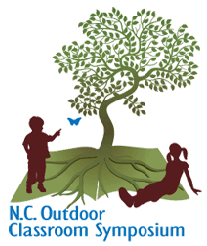
Wednesday, November 18, 2009
APNEP Demonstration Project Grants Open Until December 31, 2009
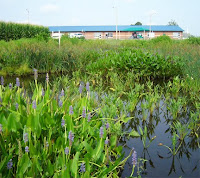
The Albemarle-Pamlico National Estuary Program is seeking proposals for demonstration projects. Grants will be awarded by APNEP, which protects water quality and other natural resources in a 36-county area of northeastern North Carolina and southeastern Virginia. Schools, government agencies, nonprofit organizations and institutions in the APNEP region are eligible to apply for grant money.
The projects must have a direct environmental benefit and occur on public lands in the APNEP region. They also must have a constructed component or vegetative planting on-site, feature a strong public outreach or education element, allow for permanent public access and have methods that may be applied in other locations. Past projects included outdoor classrooms, nature trails, rain gardens, green roofs and schoolyard wetlands.
Each project may receive up to $20,000 in funding from APNEP. The APNEP Citizen’s Advisory Committee will select the proposals to be funded and determine funding amounts. Prospective grant recipients are encouraged to partner with others to leverage additional funds. The application deadline is Dec. 31. Awards will be announced in January. All awards are contingent upon the availability of funds.
For more detailed information or to download an application, visit the APNEP Web site and click on “What's New - Request for Proposals.” If you have questions about the application or eligibility requirements, contact Lori Brinn, APNEP Community Specialist.
Not in the APNEP Region? Remember that more opportunities are listed on the Office of Environmental Education's Grants and Contests and Awards pages.
The projects must have a direct environmental benefit and occur on public lands in the APNEP region. They also must have a constructed component or vegetative planting on-site, feature a strong public outreach or education element, allow for permanent public access and have methods that may be applied in other locations. Past projects included outdoor classrooms, nature trails, rain gardens, green roofs and schoolyard wetlands.
Each project may receive up to $20,000 in funding from APNEP. The APNEP Citizen’s Advisory Committee will select the proposals to be funded and determine funding amounts. Prospective grant recipients are encouraged to partner with others to leverage additional funds. The application deadline is Dec. 31. Awards will be announced in January. All awards are contingent upon the availability of funds.
For more detailed information or to download an application, visit the APNEP Web site and click on “What's New - Request for Proposals.” If you have questions about the application or eligibility requirements, contact Lori Brinn, APNEP Community Specialist.
Not in the APNEP Region? Remember that more opportunities are listed on the Office of Environmental Education's Grants and Contests and Awards pages.
Thursday, November 12, 2009
Thursday, October 29, 2009
Tuesday, October 13, 2009
N.C. EE Partner Wins NAAEE Outstanding Service Award
 Kim Bailey, Coordinator of Environmental Education in Georgia, won the Outstanding Service for Environmental Education by an Individual Award at the 2009 National Association for Environmental Education Conference in Portland.
Kim Bailey, Coordinator of Environmental Education in Georgia, won the Outstanding Service for Environmental Education by an Individual Award at the 2009 National Association for Environmental Education Conference in Portland. Most of you in North Carolina may not know Kim, but you are familar with her work. Kim led the effort to develop the Southeastern Environmental Education Alliance (SEEA) Web site, which provides an integrated EE calendar and database for Alabama, Florida, Georgia, Kentucky, Mississippi, North Carolina, South Carolina and Tenneessee. The N.C. Office of Environmental Education was the first state agency to join with Georgia in the EPA Grant that funded the SEEA project. This partnership made the current N.C. Environmental Education Calendar and Resource Database possible. Kim worked especially hard to help the office integrate the functionality of the SEEA system into our existing Web site.
The Office of Environmental Education still works closely with Kim, who constantly looks for ways to improve the system so it can better serve the southeastern EE community. The project has also benefited the office by forging a closer working relationship with the other southeastern states.
Congratulations Kim on this very well-deserved award!
Pat Curley Wins National EE Award
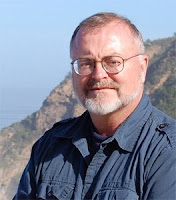 The following was reprinted from the Fall 2009 Newsletter of the Enviromental Educators of North Carolina. Thanks to the EENC Board for reprint permission, and CONGRATULATIONS PAT!
The following was reprinted from the Fall 2009 Newsletter of the Enviromental Educators of North Carolina. Thanks to the EENC Board for reprint permission, and CONGRATULATIONS PAT!Every year, the National Environmental Education Foundation (NEEF) awards the Richard C. Bartlett Environmental Education Award to an outstanding educator who has successfully integrated environmental education into his or her daily education programs. The award is given to an educator who can serve as an inspiration and model for others. The Richard C. Bartlett Award honors teachers that are bringing environmental education into the curriculum and the community, not just teaching about environmental challenges but also engaging students in the solution. We are honored to announce that EENC Board Member, Pat Curley, was one of only two teachers nationally who received a certificate of merit. The following is the text from NEEF’s announcement:
While a teacher at the Onslow County Learning Center, a school for at-risk youth in North Carolina, Bartlett Certificate of Merit recipient Patrick Curley integrated environmental education into every aspect of his teaching. In response to his students’ diverse academic and social needs, Curley took an innovative approach tohis science instruction, often leading his students on “citizen science” expeditions into the 66-acres ofl ongleaf pine forest surrounding the school to monitor the local creek and record bird breeding activity. Students have taken what they have learned inthe classroom and created positive change in the community—including building a nature trail forthe Isaac Walton League, propagating native plants for donation to the Coastal Federation, and building and maintaining an oyster shell recycling facility that will help to rejuvenate oyster populations. During the 2008-2009 schoolyear, Mr. Curley served as a “teacher-coach” for the Onslow CountySchool District, helping his fellow teachers to use the world aroundthem as a framework for integratingthe curriculum. Mr. Curley directed students and teachers to the many resources that are available through private and public agencies in orderto support and enhance instruction of environmental issues. Curley’sstudents, many of whom were once afraid of nature, now take the lead on teaching other students aboutthe natural world, and many OCLC students who were once at-risk of academic failure and had a history of disruptive behavior have developed feelingsof accomplishment in Curley’s classroom. Students have performed well on state assessments, have fewer behavioral referrals, and in many cases have returned to a traditional school environment.
Tuesday, October 6, 2009
Congresswoman Lois Capps Introduces New Environmental Education Bill
From the National Wildlife Federation:
Legislation Would Bolster NOAA’s Key Environmental Literacy Programs
WASHINGTON (September 25)—Congresswoman Lois Capps (D-CA) this week introduced H.R. 3644, a bill to bolster the National Oceanic and Atmospheric Administration’s (NOAA) environmental and conservation education programs. The new bill would authorize a national Environmental Literacy Grant program as well as a regional Bay Watershed Education and Training (B-WET) program focused on local watersheds education. The legislation gradually increases funding levels over 5 years for both grant programs and authorizes new regional B-WET programs in major watersheds nationwide.
Kevin Coyle, Vice President of Education and Training, said:“The National Wildlife Federation applauds Congresswoman Capps for developing this important legislation to bolster critical NOAA environmental education programs that will give young people a better understanding of their local watersheds and help ensure our next generation of conservation stewards.“Hands-on environmental education helps children learn about the world around them. It is a world they will inherit and must learn to take care of. Environmental education is also good for student academic performance and hands-on environmental education connects children with nature. This legislation will provide opportunities for young people to ‘Be Out There’ and spend time outdoors learning about their local watersheds, bays, estuaries and coastal areas.” “In addition to the many academic and conservation benefits of environmental education, business leaders increasingly believe that an environmentally literate workforce is critical to America’s competitiveness in the 21st Century.”
NWF’s Be Out There™ campaign was designed to get families across the United States to open the door and get outside. A daily dose of the outdoors improves children’s physical, mental and emotional well being. The benefits of outdoor play are real: healthier kids with a life-long appreciation of wildlife and nature. Visit http://www.beoutthere.org/.
National Wildlife Federation is America's largest conservation organization inspiring Americans to protect wildlife for our children's future. Visit http://www.nwf.org/. Contact: Amanda Cooke, Communications Associate, at 703-438-6041 or cookea@nwf.org Patrick Fitzgerald, Senior Legislative Representative, at 202-870-0824 or fitzgeraldp@nwf.org
Friday, September 25, 2009
Sarah Yelton Named Outstanding Earth Science Educator for 2009
 The N.C. Geological Survey, among other sponsors, annually recognizes outstanding earth science teachers and educators from among statewide nominations This year, Sarah Yelton, PreK-12 Environmental Education Program Manager for the N.C. Office of Environmental Education, was selected as the North Carolina Winner of the Outstanding Earth Science Educator Award!
The N.C. Geological Survey, among other sponsors, annually recognizes outstanding earth science teachers and educators from among statewide nominations This year, Sarah Yelton, PreK-12 Environmental Education Program Manager for the N.C. Office of Environmental Education, was selected as the North Carolina Winner of the Outstanding Earth Science Educator Award!Sarah, on the right, at one of the Science Teacher Institutes she coordinates.
This award recognizes hard work and dedication to earth science education. The award committee noted Sarah's previous work with the Mecklenburg County Park and Recreation Department as well as her accomplishments in her current position, specifically noting her work as the liaison between the N. C. Department of Natural Resources and the N.C. Department of Public Instruction.
Sarah is serving a vital role in the development of N.C. DPI's new Earth and Environmental Science curriculum, as well as helping in the development of other N.C. DPI essential standards for science.
Sarah will be honored at the N.C. Science Teacher's Association Professional Development Institute in Greensboro this November. For more information on the institute go to http://www.ncsta.org/. For more information about the OESE Award, visit the N.C. Geological Survey Web site.
Take A Child Outside Week September 24—September 30, 2009
 The Office of Environmental Education encourages parents, teachers and caregivers to take part in the NC Museum of Natural Sciences' Take A Child Outside Week! The Take A Child Outside Web site features a searchable database of activities, natural places to visit and links to organizations and agencies that are joining in with the effort.
The Office of Environmental Education encourages parents, teachers and caregivers to take part in the NC Museum of Natural Sciences' Take A Child Outside Week! The Take A Child Outside Web site features a searchable database of activities, natural places to visit and links to organizations and agencies that are joining in with the effort.The Web site, http://www.takeachildoutside.org/, also features an online pledge for parents and caregivers and allows the public to log in and post photos and stories about their outdoor adventures.
Several N.C. Environmental Education Centers and other organizations are holding events in honor of Take A Child Outside Week. Go to the statewide Environmental Education Calendar to find out more.
Still Time to Order 2009-10 Love-A-Tree Program!
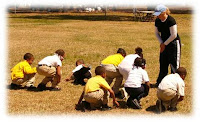
The 2009-10 Love-A-Tree Environmental Education Packets will be available in October. Teachers and nonformal educators are encouraged to order now if they would like to recieve their packets in the first mailing.
This free program is administered and designed by the N.C. Office of Environmental Education. It is made possible by a grant from the International Paper Foundation to the nonprofit Environmental Education Fund. This marks the 12th year of this very popular program, which has reached more than one million students!
All the activities have been correlated to 4th and 5th grade Science, Social Studies and Healthful Living. Priority will go to 5th grade and then 4th grade orders, but all grades are encouraged to order if you feel it will support your classroom instruction. Nonformal educators that work with these age groups are also invited to order.
The theme of this year’s packet is “Healthy Trees, Healthy People,” and provides activities that integrate environmental education, health and physical fitness. Order online today!
All the activities have been correlated to 4th and 5th grade Science, Social Studies and Healthful Living. Priority will go to 5th grade and then 4th grade orders, but all grades are encouraged to order if you feel it will support your classroom instruction. Nonformal educators that work with these age groups are also invited to order.
The theme of this year’s packet is “Healthy Trees, Healthy People,” and provides activities that integrate environmental education, health and physical fitness. Order online today!
Thursday, September 24, 2009
West Johnston High Sequoias Place Second in National Envirothon Competition
 The Sequoias members pictured above left to right Melody Lineberger, team advisor, Lewis Braswell, Frankie Johnson, Thomas Lineberger, Erin Lineberger and Stephanie Tolar.
The Sequoias members pictured above left to right Melody Lineberger, team advisor, Lewis Braswell, Frankie Johnson, Thomas Lineberger, Erin Lineberger and Stephanie Tolar. The West Johnston High School Envirothon Team, the Sequoias, won 2nd Place in the CANON North American Envirothon, which was held on the campus of UNC Asheville this year. The Sequoias competed against 52 teams from across the US and Canadian Provinces and had the highest scores in three of the five topic areas: Forestry, Soils/Land Use and Current Issues.
Each student received a $4,000.00 scholarship from CANON and plaques and medallions signifying their wins.
The Sequoias already have a winning tradition. Last year they took eight place at the national competition, which as held in Arizona.
Nationally, the Envirothon is sponsored by Canon U.S.A., and locally by the N.C. Division of Soil and Water Conservation, the state’s 96 local soil and water conservation districts and the N.C. Association of Soil and Water Conservation Districts. The competition’s Web site is http://www.envirothon.org/.
Environmental Educators of North Carolina Annual Conference

Green Spaces in Urban Places:
19th Annual Conference of the Environmental Educators of North Carolina
November 5-8, 2009 in Raleigh, NC
19th Annual Conference of the Environmental Educators of North Carolina
November 5-8, 2009 in Raleigh, NC
The Environmental Educators of North Carolina invite you to their exciting upcoming conference in Raleigh. There are three Conference “tracks” designed to meet the needs of all participants, including formal educators, EE Certification newbies and environmental education professionals. There will be “mobile workshops,” on-site workshops, and many interesting sessions, as well as evening activities.
The Friday night keynote address will be given by Ms. Akiima Price, Chief of Education and Programs with the New York Restoration Project, which restores, develops and revitalizes open spaces throughout New York City. EENC is also honored to have Dr. June St. Clair Atkinson, State Superintendent of Public Instruction, join them Saturday night to announce the recipients of The North Carolina Environmental Education Awards.
Detailed information and registration information is available at http://www.eenc.org/annualconference.html
Update on the status of the N.C. Office of Environmental Education
 The initial proposed 2009-2010 state budget included the elimination of the Office of Environmental Education. However, the final budget included funding for the office and its programs, though the office did undergo some cuts. The office’s administrative assistant position was eliminated. The budget also eliminated funding for the Department of Environment and Natural Resources Library, which is housed within the office. This included the department’s librarian position. The library collection will be transferred to the State Library.
The initial proposed 2009-2010 state budget included the elimination of the Office of Environmental Education. However, the final budget included funding for the office and its programs, though the office did undergo some cuts. The office’s administrative assistant position was eliminated. The budget also eliminated funding for the Department of Environment and Natural Resources Library, which is housed within the office. This included the department’s librarian position. The library collection will be transferred to the State Library.These are dire economic times and though the office is devastated by the loss of these staff members and of the library, we feel fortunate that the remaining staff and programs will stay intact. There are no words to adequately express the thanks that we owe our constituency for your support during this budget crisis. Our office was overwhelmed by the outpouring of grassroots support from environmental educators, citizens and organizations throughout the state.
A recent op-ed piece in the New York Times eloquently addressed the lack of time Americans spend getting outside. The columnist wrote, “One problem may be that the American environmental movement has focused so much on preserving nature that it has neglected to do enough to preserve a constituency for nature.” North Carolina is far from lacking a constituency for the environment. Along with the state’s diverse natural heritage, we have the strongest environmental education community in the country. Our office looks forward to continuing its work for North Carolina’s environmental educators, programs, resources and facilities. Thank you for all you have done to support the N.C. Office of Environmental Education. We feel extremely fortunate that North Carolina has such a unique and dedicated environmental education community.
Sincerely, the staff of the N.C. Office of Environmental Education:
Lisa Tolley
Rachel Smith
Sarah Yelton
Marty Wiggins
Libby Wilcox
Rachel Smith
Sarah Yelton
Marty Wiggins
Libby Wilcox
Tuesday, September 22, 2009
40th NAAEE National Conference to be held in North Carolina!
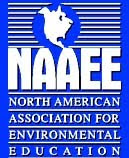
The North American Association for Environmental Education has announced that its 2011 conference will be held at the Raleigh Convention Center. North Carolina's active environmental education community and infrastructure, including the Environmental Educators of North Carolina, the N.C. Office of Environmental Education and the N.C. Association of Environmental Education Centers, were certainly factors in attracting this major conference. Of course, it is still in its early planning stages, but information about this and the 2009 and 2010 conferences are available on the NAAEE Web site.
NAAEE is hosting three Twitter Chats on the three consecutive Wednesdays before the conference: Sept. 21, Sept. 28 and Oct. 5 from 11 a.m until 5 p.m EDT. To join in, use the conference hashtag #NAAEE2011.
The final chat topic is: "How can EE programs be more inclusive, both culturally and socially?" We hope to see a lot of ideas generated, as well as sharing of first-hand experiences from businesses, environmental educators and program providers. Of course, you don't have to attend the conference to participate on the chat!
You don't use Twitter but do use Facebook? The conversation will also be posted on the NAAEE Facebook page. Just give them a like to join in!
Subscribe to:
Posts (Atom)

